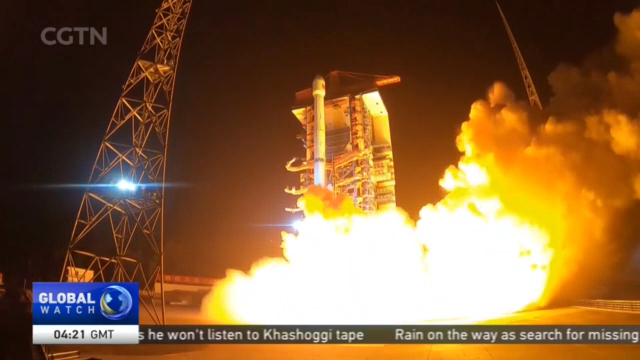
13:31, 19-Nov-2018
Beidou Navigation System: China’s homegrown sat-nav network basically completed with latest launch
Updated
13:16, 22-Nov-2018
03:24

China has sent another pair of BeiDou-3 navigation satellites into space. They were launched early Monday morning from the Xichang Satellite Launch Center in southwest China's Sichuan Province. The BeiDou navigation system will begin serving people in the countries taking part in the Belt and Road Initiative by the end of the year. CGTN'S Yang Jinghao has more.
Three, two, one, Lift off!
A remarkable blast-off from the Xichang Satellite Launch Center. This Long March-3B carrier rocket is tasked with sending a latest pair of BeiDou-3 navigation satellites into space. They entered the designated orbit after a flight of more than three hours.
ZHANG XUEYU, DIRECTOR XICHANG SATELLITE LAUNCH CENTER "I hereby declare that the launch mission was completely successful!"
This is the eleventh mission of the BeiDou-3 system, since the maiden one in November last year. Such a high frequency of launches has been a huge test for the launch base.
LI BENQI, DEPUTY DIRECTOR PLANNING DEPARTMENT OF XICHANG SATELLITE LAUNCH CENTER "One of the highlights of this mission is the two satellites are the heaviest among those in the BeiDou system so far, which almost took the maximum load capacity of the rocket. So we had to pay special attention to all the parameters of the rocket to ensure safety."
YANG JINGHAO XICHANG, SICHUAN PROVINCE "Following this launch, a basic BeiDou-3 system with a constellation of 19 satellites will be in place by year-end, when it will start serving the countries taking part in the Belt and Road Initiative, marking a great step for the homegrown navigation system as it goes global."
The BeiDou-3 project kicked off in 2009. With the efforts of Chinese scientists over the past years, the system now outperforms its previous generation in various aspects.
XIE JUN CHIEF DESIGNER OF BEIDOU NAVIGATION SATELLITE "Compared with the previous generation, the BeiDou-3 satellites have achieved many breakthroughs. For example, their lifespan has been expanded from eight years to between 10 and 12 years. Meanwhile, all the products they carry are homegrown."
Chief designer Xie highlights the upgraded atomic clocks and the inter-satellite links, two technological innovations conducive to improving accuracy in timing and positioning. As one of the four major global navigation satellite systems, BeiDou is also designed to grow into a multi-functional service provider.
XIE JUN CHIEF DESIGNER OF BEIDOU NAVIGATION SATELLITE "The BeiDou-3 system can not only provides basic positioning, navigation and timing services, the satellites are also equipped with the payloads to provide international search-and-rescue service, and our unique location reporting and short message communication services."
The navigation network is scheduled to function globally by 2020, with a dozen more satellites to be launched until then. The Chinese government says it is willing to work with international partners to promote the development of global satellite navigation systems. Yang Jinghao, CGTN, Xichang, Sichuan Province.

SITEMAP
Copyright © 2018 CGTN. Beijing ICP prepared NO.16065310-3
Copyright © 2018 CGTN. Beijing ICP prepared NO.16065310-3